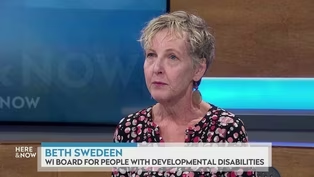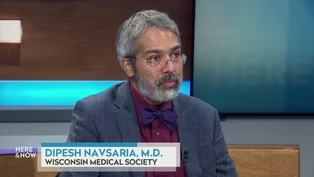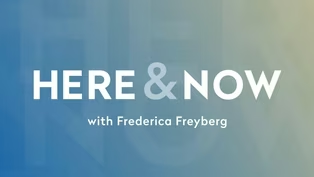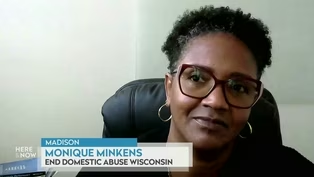Here and Now
Mayor Eric Genrich on The Green Bay Housing Partnership
Clip: Season 2400 Episode 2415 | 7m 26sVideo has Closed Captions
Eric Genrich on lowering barriers to owning a home by leasing land to reduce mortgages.
Green Bay Mayor Eric Genrich discusses the launch of a community land trust nonprofit program with the goal of lowering barriers to owning a home through leasing land to reduce the cost of mortgages.
Problems playing video? | Closed Captioning Feedback
Problems playing video? | Closed Captioning Feedback
Here and Now is a local public television program presented by PBS Wisconsin
Here and Now
Mayor Eric Genrich on The Green Bay Housing Partnership
Clip: Season 2400 Episode 2415 | 7m 26sVideo has Closed Captions
Green Bay Mayor Eric Genrich discusses the launch of a community land trust nonprofit program with the goal of lowering barriers to owning a home through leasing land to reduce the cost of mortgages.
Problems playing video? | Closed Captioning Feedback
How to Watch Here and Now
Here and Now is available to stream on pbs.org and the free PBS App, available on iPhone, Apple TV, Android TV, Android smartphones, Amazon Fire TV, Amazon Fire Tablet, Roku, Samsung Smart TV, and Vizio.
Providing Support for PBS.org
Learn Moreabout PBS online sponsorshipfamilies and students will suffer.
>> Beth Swedeen, thanks very much.
>> Everyone knows how expensive it is to buy a house these days.
In Wisconsin, home prices have risen much faster than incomes, according to the Wisconsin Policy Forum.
That freezes out renters from creating generational wealth through homeownership.
But there are innovative ideas to get people into their own homes, like land trusts, where the buyer gets a mortgage for the home only and then leases the land under it from a nonprofit.
The result?
Affordable home ownership, a new community land trust program is taking shape in green Bay.
Its mayor, Eric Genrich, joins us with more.
And mayor, thanks a lot for having me.
programs in other parts of the state.
What made you interested in this idea?
>> Well, as you said, yes, we're certainly not the first ones to adopt a community land trust here in green Bay.
I believe area, southeast Wisconsin.
La Crosse I believe area has one as well.
And it's really a movement that's that's grown pretty significantly over the last few years.
You know, you did a great job of kind of giving an overview of that concept and why it's so appealing to us is, is the idea that we will be able to set aside a certain number of homes that will remain relatively affordable forever?
There's a number of strategies that we deploy currently within the city of green Bay and that are common, I think, across the country.
But oftentimes those periods of affordability are limited to, you know, 15 years or a couple decades or something like that with the with the Community Land Trust model, because the rate of appreciation is managed a bit and regulated a bit for for those who own these homes, these homes will, especially in the long term, be a lot more affordable when you compare them to to other homes that are available on the private market.
>> Yeah, this wouldn't be city or public housing, right?
How would it work?
>> Correct.
Yeah.
No, clarifying question.
Yeah.
We've partnered with Neighborworks green Bay, which is a local housing nonprofit.
But they're a they're a local affiliate of a nationwide organization, Neighborworks America.
And so they have a lot of access to expertise around the country with fellow affiliates who have gone down this, this path of community land trust.
And so it's a great partnership that's already been established.
But I humanity was a was a really instrumental part of this brainstorming process.
You know, they're going to have representation on this nonprofits, the Chamber of Commerce was really instrumental as well.
When we were figuring out exactly how we would structure this.
And so a lot of folks have been involved, and we're looking for even more to continue to be involved in the future, because this is not something that that only can be supported by the city government.
It's really going to require and generous individual donors, foundations and things to to make sure that this gets to the stage or to the level that really has an impact on housing affordability.
community, how out of reach is home ownership for most people?
>> You know, relatively speaking, homeownership is is easier to attain here in green Bay than it is in many other parts of the on one of these lists where it said green Bay was the number one place for people on Social Security to to to live.
So relatively speaking, you know, we're we're affordable.
But in comparison to our history, not at all the case.
You know, we've seen home prices in the city of green Bay go up, you know, double digit percentage points pretty much every year over the last five years.
So homeownership is out of reach, unfortunately for far too many people.
And we're in the position of really, you know, taking in all of the above approach to housing affordability here in the city of green Bay.
We recognize that not one single solution is going to get us to that point.
But community Land trust, we feel, is definitely a tool that hasn't been utilized in the past and needs to be part of the equation in the future.
If someone buys a house through the Community Land Trust first, how affordable might it be to get in?
And then can they sell it at a profit?
>> Right?
Yes.
So, you know, it is expensive just to construct a home these days.
So so some of those costs are kind of built in the way that we're going to be able to bring down the cost of construction is really through private philanthropy, as I was suggesting.
So it's going to be important for, for donors to step up to, to bring that initial cost down to a level affordability for low and moderate income folks going forward.
Once we, you know, construct the home, find the family, set up a situation where they're able to to purchase this home, they would be able to realize a percentage of increase in value over the years.
So I think the the formula that's been arrived on is 2% a year.
So certainly, you know, these families are going to be able to to pull out some of that equity if they were to decide to sell the home down the line.
But it's not going to be to the extent that we've seen in the really where these homes become even more affordable ten, 20, 30 years down the line.
>> In your city's model, the plan is to provide wraparound services.
What do those look like?
>> You know, a lot of those, I think are going to be determined in the future.
But I was, you know, referencing the fact that we were working closely with Neighborworks green Bay.
They're the really the housing agency in town and, and are going to be the ones who are operating the, the land trust.
And so, you know, they're really well training.
You know, anti-eviction training that they've been been doing for decades here.
And so they're really going to be the entity that that are going to figure out exactly going to be necessary for these homeowners, but they're really well placed to do that.
>> What kind of stability for a community?
Do owner occupied homes create?
>> Yeah, I mean, they're so essential here in in green Bay.
We have a great system of of neighborhoods.
We just celebrated the 50th neighborhood association to be established within the city of green Bay.
I think historically, homeowners have have played, you know, more of an instrumental role in some of those organizations.
But we residents play and absolutely encourage people who are, you know, in the rental housing environment, in condos and homes to to step up and take some ownership of their neighborhoods.
But homeownership is is still really a dream for many people.
And it's it's a great way, you know, to to set aside some, some wealth for yourselves and for your families down the line in the land trust model.
It's like I was explaining earlier, it's, you know, it's kind of modestly controlled, but it's still a great way, as I said, to to develop a nest egg for yourselves and for for your children and grandchildren.
that we want to encourage.
>> We'll be watching this >> We'll be watching this
Beth Swedeen on Federal Cuts to Special Education Funding
Video has Closed Captions
Clip: S2400 Ep2415 | 6m 9s | Beth Swedeen on impacts of the U.S. Department of Education cuts on special education. (6m 9s)
Dr. Dipesh Navsaria on Food Insecurity and Children's Health
Clip: S2400 Ep2415 | 5m 19s | Dipesh Navsaria on impacts of food assistance on nutrition and mental health of children. (5m 19s)
Here & Now opening for October 17, 2025
Video has Closed Captions
Clip: S2400 Ep2415 | 1m 9s | The introduction to the October 17, 2025 episode of Here & Now. (1m 9s)
Monique Minkens on Domestic Violence Homicides in Wisconsin
Video has Closed Captions
Clip: S2400 Ep2415 | 16m 23s | Monique Minkens on Wisconsin's record number of domestic violence-related homicides. (16m 23s)
Providing Support for PBS.org
Learn Moreabout PBS online sponsorship
- News and Public Affairs

Top journalists deliver compelling original analysis of the hour's headlines.

- News and Public Affairs

FRONTLINE is investigative journalism that questions, explains and changes our world.












Support for PBS provided by:
Here and Now is a local public television program presented by PBS Wisconsin



